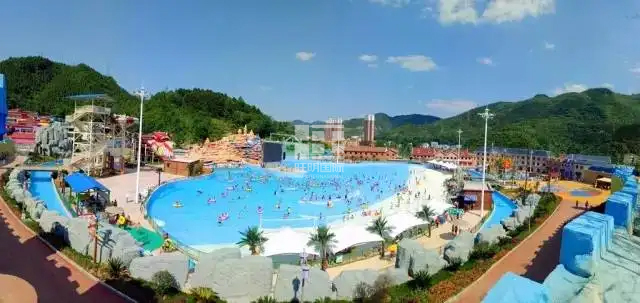How to Procure Equipment for Water Park Construction
Procuring equipment for a water park is a critical task that directly impacts the park’s operational safety, visitor experience, and economic performance. Below is a detailed guide to water park equipment procurement
Procuring equipment for a water park is a critical task that directly impacts the park’s operational safety, visitor experience, and economic performance. Below is a detailed guide to water park equipment procurement:

1. Define Procurement Requirements
-
Park Positioning & Target Audience: Clarify the park’s positioning (e.g., family-friendly, youth-oriented, or luxury) and target demographics, as these will influence equipment selection and budget allocation.
-
Functional Zone Planning: Divide the park into functional zones (e.g., children’s play area, adult challenge zone, leisure area) and determine the types and quantities of equipment required for each zone.
-
Budget Planning: Establish a realistic procurement budget based on investment scale and expected revenue to ensure cost-effectiveness.
2. Market Research & Supplier Selection
-
Market Research: Investigate market trends, technological features, and pricing through industry expos, online searches, and peer recommendations.
-
Supplier Shortlisting: Screen suppliers based on certifications, technical expertise, and reputation. Prioritize manufacturers like Haishan Playtech or Tailong Industries (for high-end projects) or cost-effective brands for smaller budgets.
-
On-Site Inspections: Conduct factory visits to evaluate production capacity, quality control systems, and after-sales service capabilities.
3. Equipment Selection & Evaluation
-
Safety Compliance: Prioritize equipment that meets national safety standards and regulations, with robust safety features (e.g., emergency stop systems, lifeguard protocols).
-
Quality Assurance: Assess materials (e.g., corrosion-resistant stainless steel), manufacturing precision, and durability.
-
Functional Suitability: Choose equipment tailored to each zone’s purpose (e.g., kiddie slides, wave pools, lazy rivers) to meet diverse visitor needs.
-
Equipment Compatibility: Ensure seamless integration between devices to optimize operational efficiency.
4. Contract Negotiation & Payment
-
Contract Terms: Specify equipment specifications, quantities, pricing, delivery timelines, installation requirements, and after-sales support in the contract.
-
Payment Structure: Agree on phased payments (e.g., advance payment, progress payment, final payment) to safeguard financial interests.
5. Equipment Installation & Acceptance
-
Professional Installation: Hire certified technicians to ensure installations adhere to design blueprints and safety guidelines.
-
Testing & Commissioning: Conduct rigorous post-installation testing and trial runs to verify performance.
-
Final Inspection: Organize a formal acceptance process to confirm compliance with contractual standards and regulatory requirements.
6. After-Sales Support & Long-Term Partnerships
-
Comprehensive After-Sales Service: Partner with suppliers offering prompt maintenance, spare parts availability, and emergency troubleshooting.
-
Sustainable Collaboration: Build long-term relationships with reliable suppliers to facilitate future upgrades and expansions.
By systematically addressing procurement planning, supplier vetting, safety compliance, and lifecycle management, you can secure high-quality equipment that aligns with your water park’s operational goals and enhances its long-term success.

Ranking of Water Park Equipment Companies & The Top Water Park Equipment Company In China

Ranking of Water Park Design Manufacturers? Here's a Comprehensive List of Water Park Design Companies

Which Manufacturer to Choose for Water Park Rides? Recommendations for Water Park Equipment Companies

Large Water Park Equipment Manufacturers? Which Water Play Facility Manufacturer is the Best?

Analysis of Water Park Equipment and Recommendations for High-Quality Manufacturers
FAQs
How long does it usually take for WM International's water park design projects to be completed?
The project cycle varies depending on the project size, design complexity and customer needs. Generally speaking, the complete planning and design process usually takes 2-6 months. We will confirm the schedule with the customer at the beginning of the project and ensure that the design work is completed on time.
How to start working with WM International for water park project design?
You can contact us through our official website contact form or call our customer service team directly. We will conduct initial communication based on your needs, arrange project surveys and analysis, develop personalized design plans, and provide detailed service processes and quotations.
What are the advantages of WM International's design team?
Our design team has rich project experience in planning, landscape, architecture, structure, equipment and other fields. The team members include many senior experts at home and abroad to ensure that each project can combine the latest technology and design concepts in the industry to provide the best solutions.
What are the main contents of water park planning and design services?
We provide a full range of water park planning and design services, including site analysis, theme setting, facility layout, visitor flow design, safety and environmental protection design, etc. Our goal is to create a safe and entertaining water park through scientific planning and creative design to enhance the visitor experience.
Does WM International provide post-operation and maintenance support for the water park?
Yes, we not only provide design and construction services, but also provide operation and maintenance support for the water park. We can provide equipment maintenance, regular inspections and optimization suggestions according to customer needs to ensure the long-term efficient and safe operation of the park.

Huge Bowl Water Slide

Time Tunnel Water Slide

Children Combined Water Slide

Big Tourbillion Water Slide

Small King Cobra Water Slide

Turnover Slide
Get in touch
Have to get customized water park solutions and product quotes.
We will provide you with professional consultation and support.








 Scan QR Code
Scan QR Code
wmwaterslide
wmwaterpark